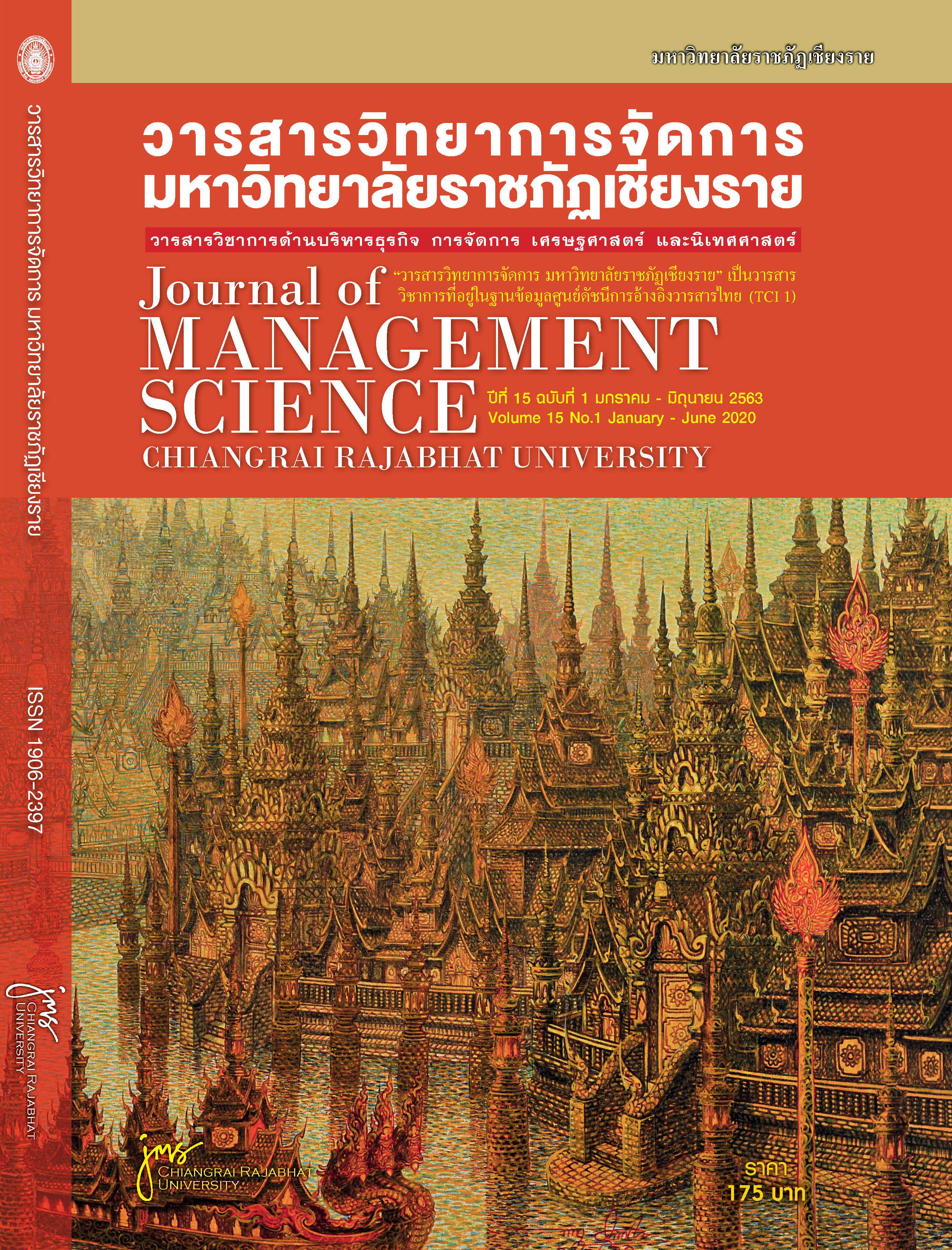The Relationship between the Sufficiency Economy Philosophy Practice and Performance Represented by the Balanced Scorecard : A Case Study of SME’s in Songkhla Province
Main Article Content
Abstract
This study aims to investigate the level of sufficiency economy philosophy practice and performance represented by balance scorecard of SME’s in Songkhla province, and to test the relationship between sufficiency economy philosophy practice and performance. Population and sample are SME’s of Songkhla province. Descriptive analysis and multiple regression are analyzed the data. As the results, the level of sufficiency economy philosophy practice comprising of the moderation, reasonableness, self-immunity, knowledge and morality and performance represented by balance scorecard comprising of the financial, customer, internal process and learning & growth was in high level. Moreover, there is positively significant relationship between the level of sufficiency economy philosophy practice in terms of reasonableness, self-immunity, knowledge, and morality, and performance represented by balance scorecard.
Article Details
Views and opinions expressed in the journal do not necessarily reflect those of the editors.
References
Avery, G. C. (2005). Leadership for sustainable futures: achieving success in a competitive world. Cheltenham, U.K. : Edward Elgar Publishing.
Cronbach, L.J. (1951). Coefficient alpha and the internal structure of tests. Psychometric. 16(1). 297-334.
Decharin, P. (2004). Implementing balance scorecard (4th ed.). Bangkok : Chulalongkorn University. (in Thai)
Hatetong, P. (2016). The relationship between ownership structure, environment, and performance measurement of finance and non-finance. In Research for Well-Being. 156-163. July 7-8, 2016, Walairuk University. Nakhonsithammarat : Walairuk University. (in Thai)
Kantabutra, S. (2006). Relating vision-based leadership to sustainable business performance: a Thai perspective. Kravis Leadership Institute Leadership Review. 6(Spring). 37-53. (in Thai)
Kantabutra, S. (2010). Suffiency economy philosophy practices in business sector for sustainability. Bangkok : National Institute of Development Admistration (NIDA). (in Thai)
Kantabutra, S. (2010). Philosophy of suffiency economy in business and sustainable development. Human Resource Management by Sufficiency Economy Philosophy. 4(1). 143-185. (in Thai)
Mongsawad, P. (2010). The philosophy of the sufficiency economy: a contribution to the theory of development. Asia-Pacific Development Journal. 17(1). 123–143. (in Thai)
Nindum, S & Rattanasimakul, K. (2017). The Diffusion of Philosophy of the Economic Sufficiency
in Thai Mass Media, and Understanding and Acceptance of People in Chiang Rai Province. Journal of Management Science Chiang Rai Rajabhat University. 12(1). 1-34. (in Thai)
Nuttavuthisit, K. (2005). Applying sufficiency economy philosophy in business organizations: a case of Panda Jewelry. Bangkok : Office of National Economic and Social Development Board. (in Thai)
Office of small & medium enterprises promotion (OSMEP). (2017). Small and Medium Sized Enterprise Situation Report. Retrieved November 8, 2017, from www.sme.go.th. (in Thai)
Pruetipibultham, O. (2010). The sufficiency economy philosophy and strategic HRD : a sustainable development for Thailand. Human Resource Development International. 13(1). 99-110. (in Thai)
Silpcharu, T. (2010). Research and statistical analysis by SPSS (11st ed.). Bangkok : S.R. Printing Mass Product. (in Thai)
Suriyankietkaew, S. & Avery, G. (2016). Sustainable leadership practices driving financial performance: empirical evidence from Thai SMEs. Sustainability. 8(1). 1-14. (in Thai)
Suttipun, M. (2014). Corporate characteristics, CSR reporting, and firm financial performance: an evidence of Thailand. Corporate Ownership and Control. 12(1). 844-855. (in Thai)
Suttipun, M. & Saefu, S. (2017). Investigation of sufficiency economy philosophy reporting in Thailand. DLSU Business & Economics Review. 26(2). 53-65. (in Thai)
Suttipun, M. & Sittidate, N. (2016). Corporate social responsibility reporting and operation performance of listed companies in the Stock Exchange of Thailand. Songklanakarin Journal of Social Sciences and Humanities. 22(1). 269-295. (in Thai)
Teeratanachaikul, K. (2010). Performance measurement by balance scorecards in software industry. Srinakharinwirot Business Journal. 2(1). 135-147. (In Thai)
ThaiPat Institute. (2017). The KPI’s of Sustainable Development Reporting of Listed Company in the Stock Exchange of Thailand. Retrieved October 3, 2017, from www.thaipat.org. (in Thai)
Yamane, T. (1973). Statistic: An Introductory Analysis (3nd ed.). New York : Harper and Row.


